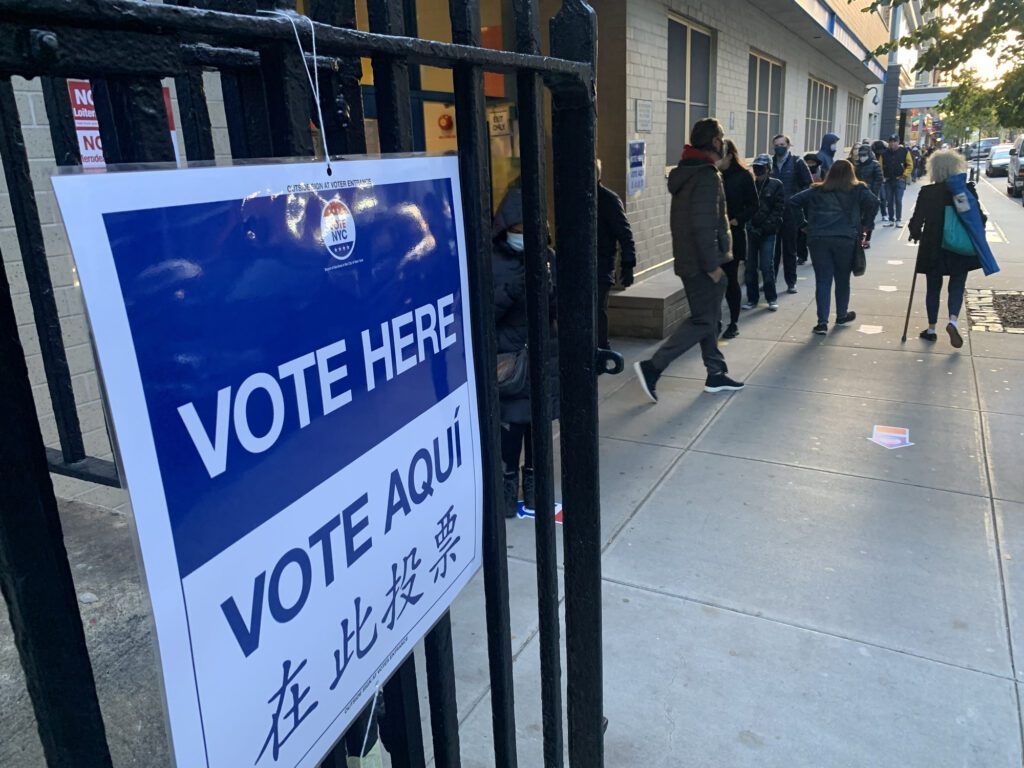Democrats Ponder ‘Nightmare Scenario’ After New Jersey, Virginia Results

At least one historical trend continued Tuesday with voters rejecting the gubernatorial candidate of the sitting president’s party in Virginia as Republican Glenn Youngkin bested Terry McAuliffe.
And in what could be an ever bigger warning sign for Democrats ahead of next year’s midterms, New Jersey’s gubernatorial contest remains unexpectedly tight with Republican Jack Ciattarelli on the verge of upsetting Gov. Phil Murphy. Taken together, it’s a clear cause for alarm for Democratic practitioners.
“The national environment ended up being really terrible tonight for Democrats,” former Obama manager David Plouffe said on MSNBC late Tuesday, pointing to the big swing in white women without college degrees toward Youngkin in Virginia.
In a Washington Post exit poll, white women with some college education or less went for the Republican by 75 percent — a nearly 20-point increase from President Trump’s share two years ago. If that trend continues into 2022, it’ll be a “nightmare scenario” for Democrats akin to 2010, Plouffe warned.
For other practitioners on the left, Tuesday’s result points to the urgency of challenging right-leaning media and influence operations that feed on distribution on platforms like Facebook.
“How did education become a top issue for VA voters? Right-wing media. They create controversies out of thin air that prey on people’s existing fears, anxieties + biases, feed their base + keep Dems on defense, then all other media pile on. Every damn time,” Tara McGowan, who’s behind an effort to counter disinformation called Good Information, Inc., tweeted Tuesday.
It’s not just online publishers where the right had an advantage, either. In the final week in Virginia there were 4,000 more posts about Youngkin by 1,000 unique authors, the majority of them positive or neutral, according to an analysis by Impact Social, which monitors posts on Facebook, Twitter, Reddit, blogs, news sites and other online forums.
And it’s worth noting the report found education wasn’t a main discussion point. The issue appeared in only 5 percent of positive posts about Youngkin and 8 percent of negative posts between Oct. 26-Nov. 2.
On the digital advertising front, GOP strategist Steve Johnston said one lesson from Tuesday for Democrats should be resource management: “It’s notable that in New Jersey, Ciattarelli outspent Murphy on Google/YouTube $1,224,400 to $28,400, an astounding 43 to 1 margin.”
Johnston, a partner at FlexPoint Media, noted Murphy’s nearly $3 million more cash on hand than Ciattarelli going into the final week of the campaign. “There’s no excuse for being so knowingly and willingly outgunned, and there’s no reward for finishing with the most money in the bank,” he said.
Another debate for Democrats that’s certain to continue in the wake of the Virginia loss: the efficacy of the heavy volume and hair-on-fire tactics employed by McAuliffe’s email fundraising operation. From the standpoint of dollars-raised, McAuliffe’s operation was a success, but in the closing stretch of the race the number of emails the Democrat’s campaign was sending per day averaged double digits. That generated criticism from some digital strategists who have been pushing the party toward better email practice.
In the wake of McAuliffe’s defeat, digital strategist Laura Packard tweeted that even though she “never signed up” for McAuliffe’s list she was “bombarded with ‘all hope is lost’ emails multiple times a day.
“We can’t prove this yet (I think) but that HAS to have an effect on the morale of your base. Dems, stop doing this,” Packard tweeted.
The morning of Election Day, McAuliffe spokesperson Christina Freundlich pushed back on some of the criticism of the campaign’s email fundraising operation by trumpeting its top line results, noting it raised $16 million from 500,000 donations.
Democratic strategist Josh Nelson, who heads The Juggernaut Project, has argued the party needs to take a longer-term view with regard to email fundraising tactics, even as individual fundraising operations are producing big totals.
“As far as I know, no one who works in the industry denies that guilt-tripping people, using extreme hyperbole that borders on deception and sending an exceptionally-high volume of email works to raise money,” Nelson tweeted Tuesday night. “The concern is that those very same tactics are driving some potential donors away from the Democratic fundraising ecosystem entirely, and that they may be doing damage to the public’s perception of the Democratic Party and its candidates as a whole.”
